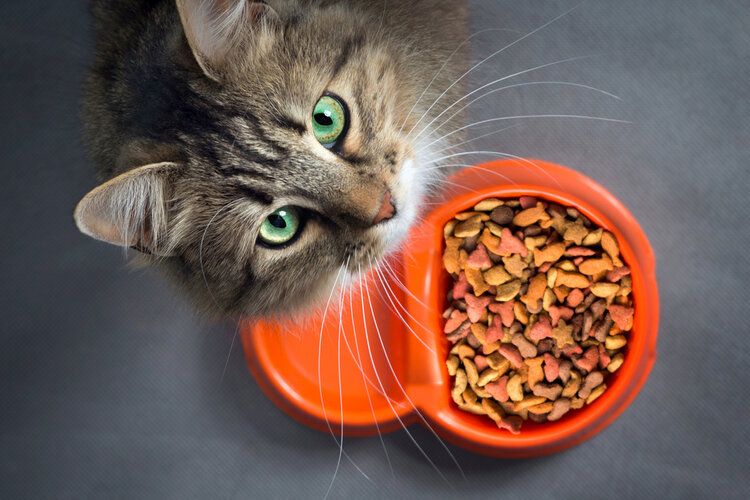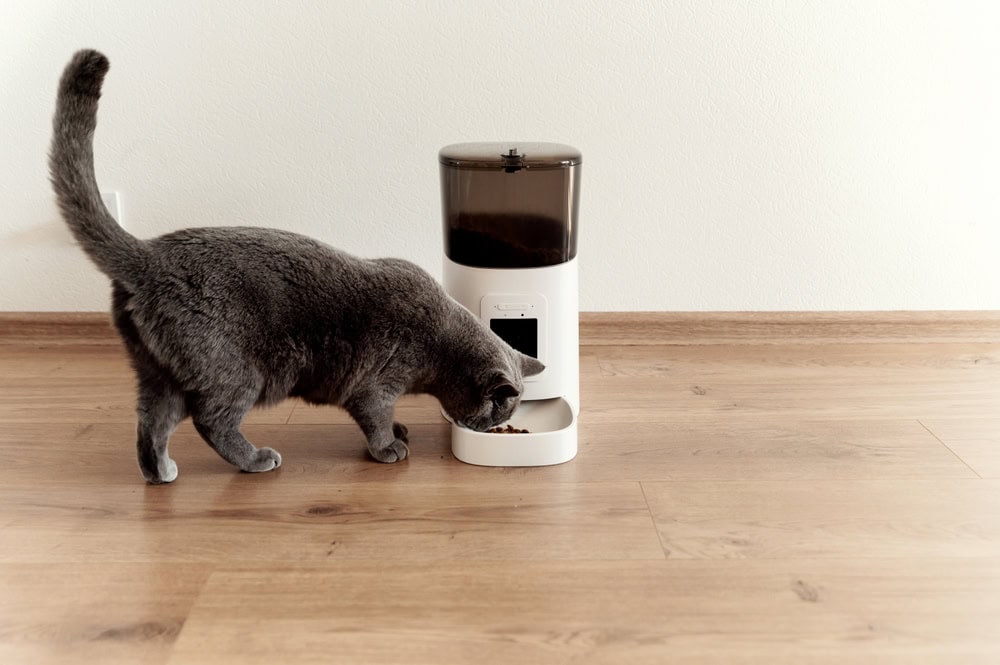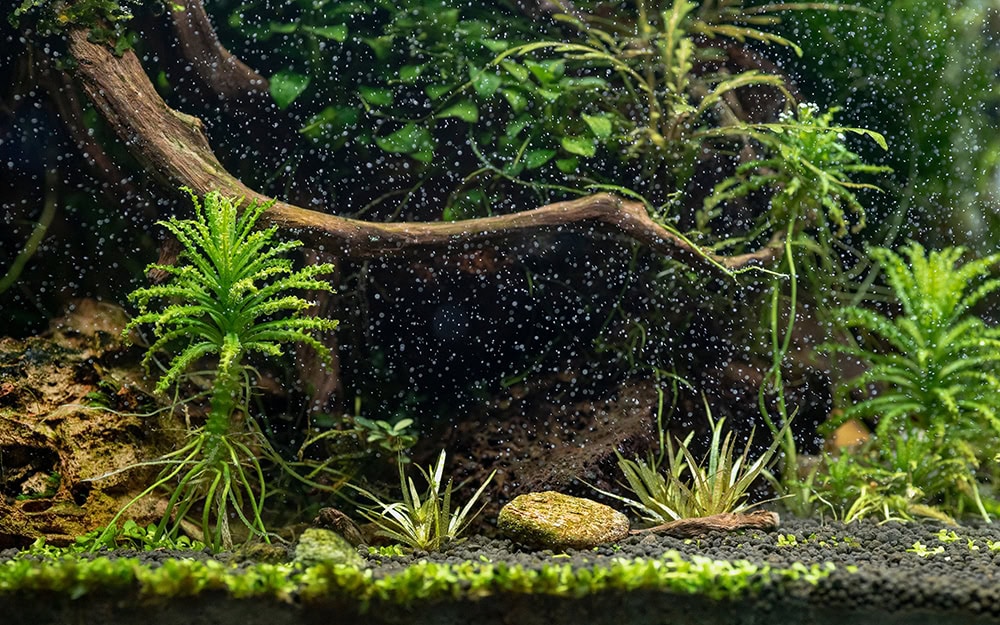F1 vs F2 Savannah Cat — What’s The Difference? (With Pictures)

Updated on
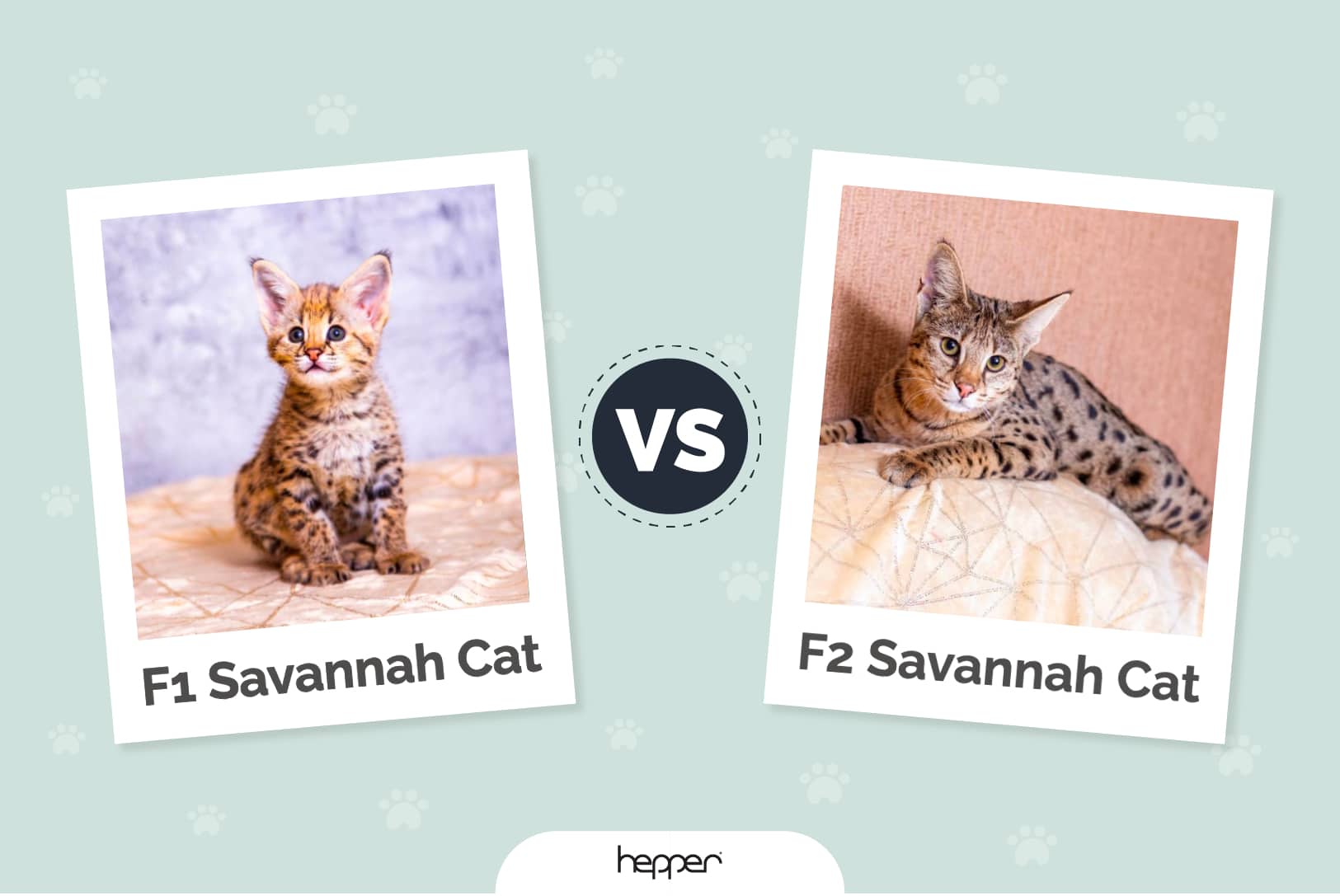
Savannah cats are hybrid cats initially produced from a domestic cat and an African serval in the 1980s. Servals are wild cats native to Africa, and the Savannah’s classification system shows how much “serval” is bred into the resulting kitten. The filial classification (F1, F2, etc.) shows how much serval DNA is in the offspring and how far removed from pure servals they are.
Wild traits can be present in both F1 and F2 (and F3, 4, etc.) Savannah cats, but they are usually more toned down the higher the filial number is. However, several states have laws governing which Savannah cats can and can’t be kept as domestic animals based on their filial classification.
Visual Differences
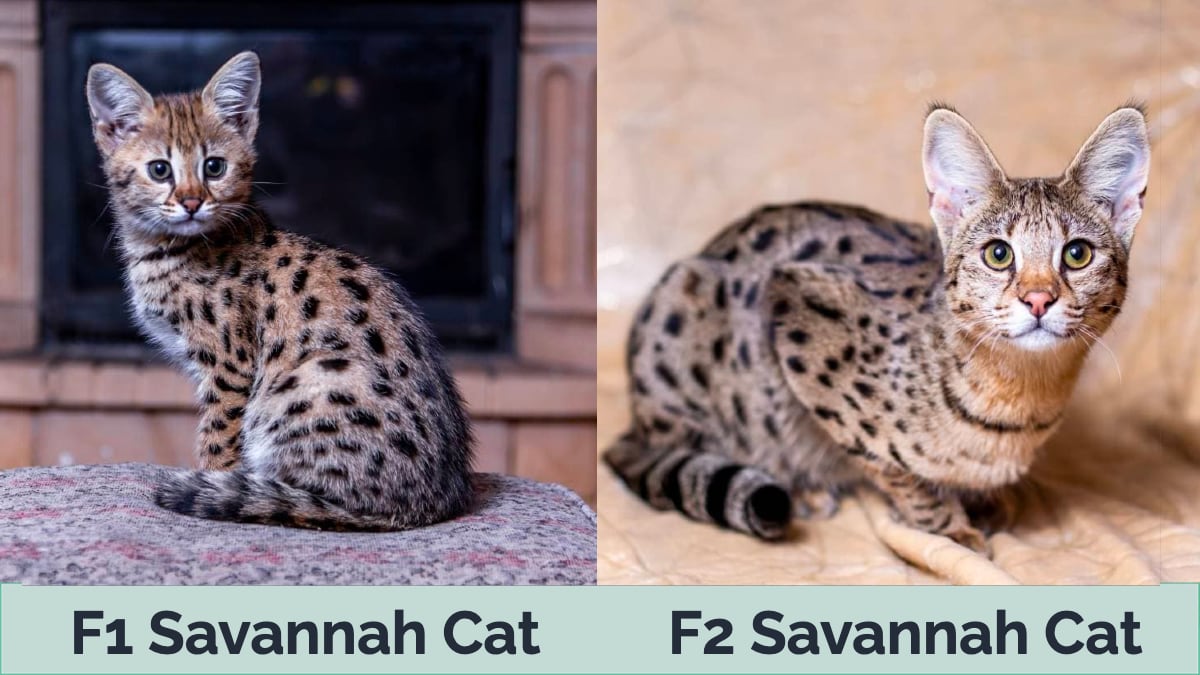
At a Glance
- Average height (adult): 16–18 inches
- Average weight (adult): 13–25 pounds
- Lifespan: 15–20 years
- Exercise: 2+ hours a day
- Grooming needs: Low
- Family-friendly: No
- Other pet-friendly: Rarely
- Trainability: Intelligent, active, loyal, willing, mischievous
- Average height (adult): 15–18 inches
- Average weight (adult): 13–25 pounds
- Lifespan: 15–20 years
- Exercise: 2+ hours a day
- Grooming needs: Low
- Family-friendly: Yes
- Other pet-friendly: Sometimes
- Trainability: Intelligent, active, willing, loyal, loving
 F1 Savannah Cat Overview
F1 Savannah Cat Overview
The F1 Savannah cat is the closest genetically to a serval. One parent (usually the father) is a serval, while the other is a domestic cat. These are typically bred with other servals or Savannah cats, but because F1-F3 savannas are often sterile, Savannah cats are crossed with breeds, such as the Siamese.
As a result, the wild traits of these cats can vary, as the genetics of this hybrid aren’t fully understood. Despite this, F1 Savannahs are quirky, feisty, and loving cats that make great companions to experienced owners.
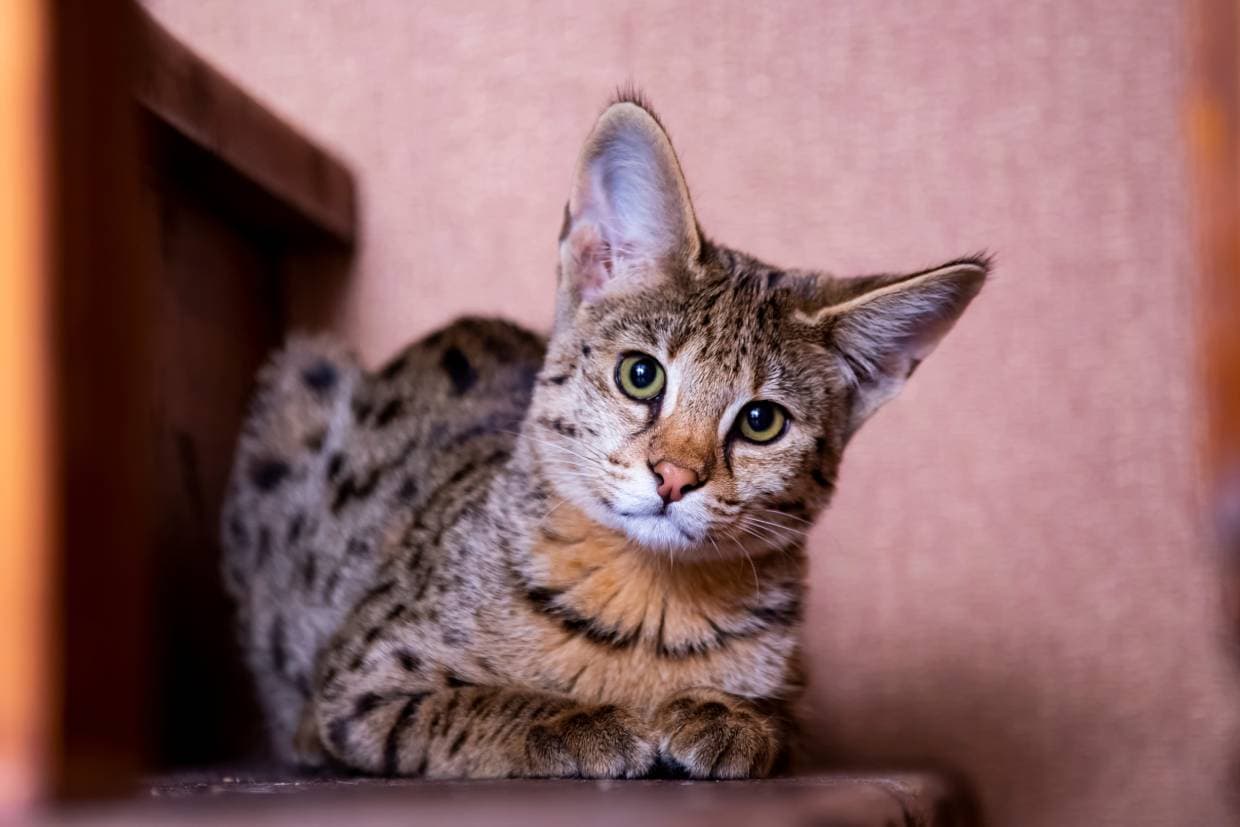
Personality / Character
While the F1 and F2 Savannah cats don’t have too many personality differences, there are some notable traits. F1 Savannah cats bond very closely with their owners, who often fall in love with their wild cat tendencies. Jumping, swimming, and playing are the staples of the F1’s personality, with expeditions onto cabinets (Savannah cats can jump 8 ft into the air from standing) being a favorite pastime.
F1 Savannahs are less sociable than their F2 offspring and don’t particularly like interacting with strangers. Often weary of those they don’t know, the F1 prefers to spend time with its owners and those they know well and trust. They’re not great with children and noisy environments for this reason. They may be defensive against strange people and cats, but they are known for being sweet to their owners and often follow them around.
Training
The F1 Savannah cat needs lots of mental stimulation to keep it happy and content, including time spent training. They are trained easily due to their intelligence, often described as dog-like in their focus and willingness. They can be trained with a clicker and love to play fetch and swim. Socialization is vital in a young Savannah cat’s life, as introductions to different people and animals can counter some of the reluctance they can show toward strangers.
Health & Care
A good diet is key to the health of these hybrids. A meat-heavy diet is best since Savannahs need plenty of protein to fuel their high-energy lives. Consider talking to your veterinarian about added taurine; while all commercial cat diets will have added taurine, the F1 Savannah may need more than what’s provided in a commercial diet to keep their hearts healthy because of their wild ancestry.
Getting your F1 used to teeth brushing at an early age is critical, as well as getting them used to handing their paws and clipping their claws. There aren’t many health problems that plague the F1 Savannah. However, one significant problem that could occur is Hypertrophic Cardiomyopathy (HCM), which affects many hybrids. HCM is an enlargement of the heart muscle, meaning it can’t pump as effectively and can lead to blood clots, heart failure, and eventually death.
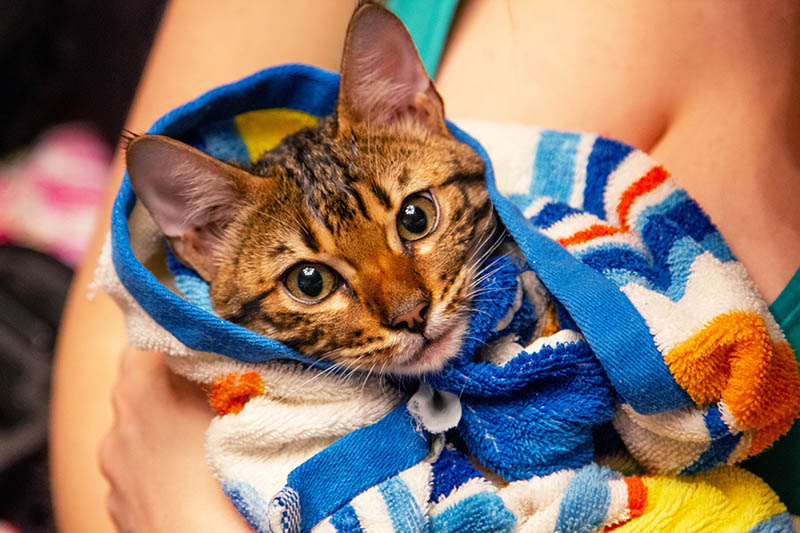
Exercise
The F1 Savannah cat needs a lot of exercise to keep them happy and ward off undesirable behavior. This cannot be reiterated enough since F1s are large cats that could seriously hurt someone if they become aggressive, meaning keeping them entertained and correctly exercised is paramount. Luckily, they can easily be trained to walk on a harness so they can be taken out for walks. The F1 Savannah likes interactive toys and will thrive with a “catio” installation. A catio is an enclosed structure attached to a window or porch that a cat can access whenever it wants fresh air. Savannah cats like swimming, so access to a kiddy pool can provide hours of fun, but never force your cat into the water if they don’t want to go, and always supervise them.
Grooming
Daily grooming is recommended for the F1 as it provides bonding opportunities and allows you to check their coats and skin for any abnormalities, but they don’t shed much and are proficient groomers themselves. If you cannot brush your F1 every day, try to brush it at least once a week. Maintaining the cat’s dental health, checking its ears, and trimming its nails are also crucial tasks.
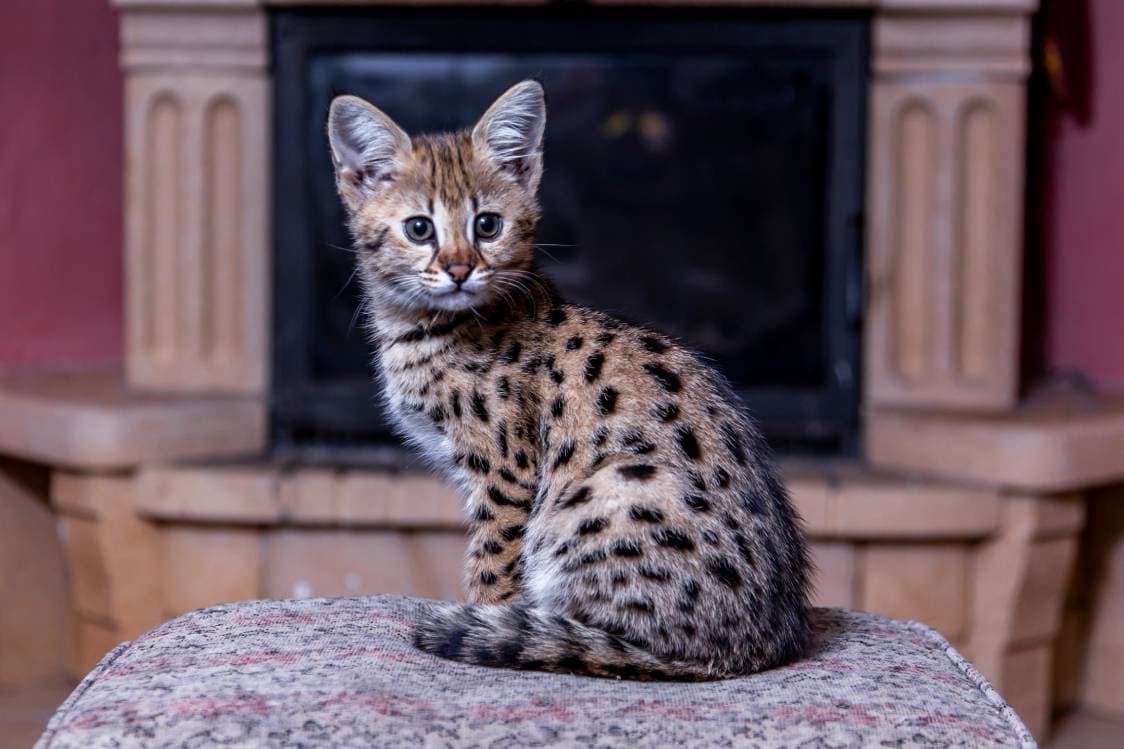
Suitable for:
The F1 Savannah cat is suitable for experienced cat owners. F1 Savannahs are not lap cats; their activity levels require active owners with time to spend on them. The means to provide them with the added space and potential vet bills are also needed, as these cats are large and need ample space to roam and play. They are not suitable for apartment living. People who work from home would be ideal, as Savannahs don’t do well on their own. Families with older children are recommended, as the F1 Savannah may cause injuries to smaller children who don’t understand their needs.
- Exciting
- Adventurous
- Loving
- Loyal
- Easy to train and take out on walks in a harness
- Extensive exercise and time needs
- Costly
- Training and socialization critical for a well-balanced adult
- Not suitable for families with children or other pets
 F2 Savannah Pet Breed Overview
F2 Savannah Pet Breed Overview
The F2 Savannah cat is much like the F1. They are the offspring of two F2 Savannah cats (if fertile) or an F1 Savannah cat and a domestic cat. They can be slightly smaller than the F1 Savannah. Usually, there are no noticeable differences in physical traits, but there are variations from litter to litter. They are usually more predictable, as their characteristics can be somewhat diluted due to the mixing of domestic cat DNA.
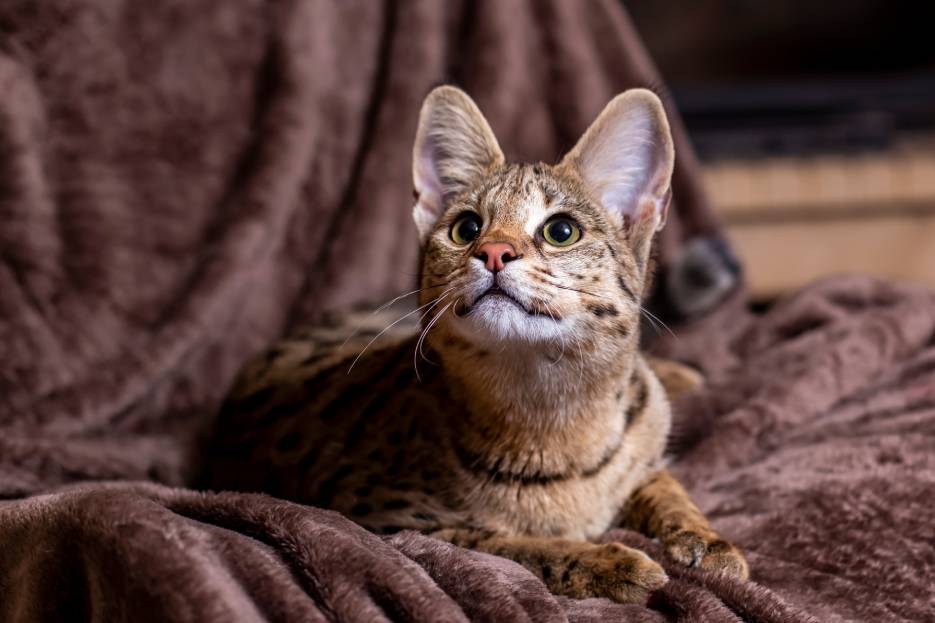
Personality / Character
The F2 Savannah cat is usually more friendly and open toward strangers, but this can depend on socialization during their kittenhood. They’re just as lively as the F1 and love to run, leap, and climb. They retain some of their wild traits just as the F1 does, such as a penchant for swimming and jumping onto high surfaces to survey their environment. They’re sunny cats with loving personalities but can still be anxious when strangers enter the home.
Exercise
The F2 Savannah cat will need just as much exercise as the F1, with the need to get out and explore being paramount. They can still be easily trained to use a harness and leash, so taking them out for walks is recommended. They need around 2 hours of exercise a day, so between walks and playtime, you can purchase a cat tree and provide interactive toys to keep the cat fit.
Training
The training of an F2 Savannah cat is also similar to the F1. They are just as intelligent and willing to learn new tricks, and playing fetch is one of their favorite games. Clicker training is helpful with F2 Savannah cats, especially if a tasty treat is used for positive reinforcement. The F2 Savannah cat may find it easier to adapt to home life than an F1, but this again depends on how well-socialized it was as a kitten. Exposure to various people, children, pets, and noises such as washing machines can all help them adapt to life inside a home.
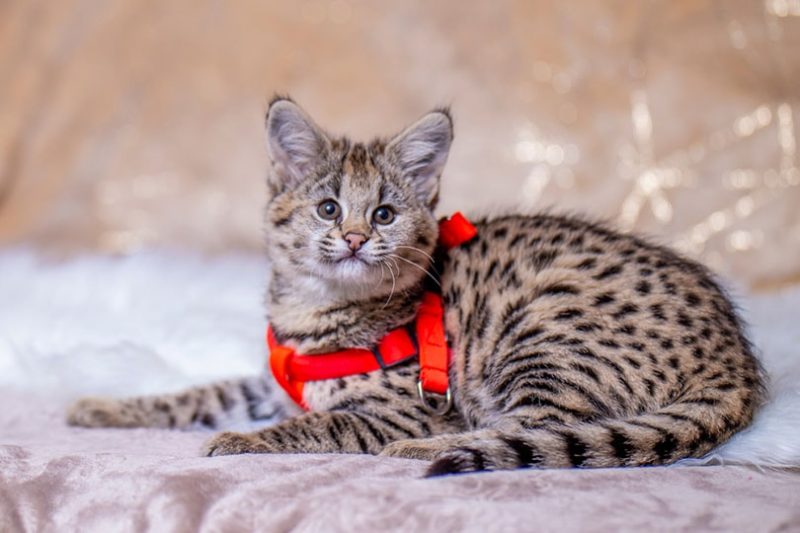
Health & Care
F2 Savannahs are relatively healthy but susceptible to HCM, like the F1s. However, the cat the F1 was bred with to create the F2 (such as a Siamese) may have conditions that can be passed down to the F2 Savannah. However, you can ensure that a breeder has performed blood and DNA tests to ensure your F2 comes from healthy stock.
Grooming
The F2 Savannah cat doesn’t need much grooming, but daily brushing allows you to look for any lumps, bumps, or problems with their skin and coat. They are meticulous groomers, so they won’t need much extra help. However, you should regularly clip the cat’s nails, brush its teeth, and check its ears for mites.
Suitable for:
The F2 Savannah cat is suitable for experienced cat owners with some knowledge of a hybrid’s particular needs. They are suitable for families with older children, but the F2 is still a bit too wild to play with infants. Older children who can take part in their training will gain a loving companion for life. They are perfect for families with large open spaces and the time to take them outdoors on a harness, but they aren’t suited to apartment living.
- Active and loyal
- Loving
- More Sociable
- Able to go out on walks
- More friendly toward children
- Time intensive
- Can’t be home alone for long periods
- Training and socialization important for a well-rounded individual
- Can be wary of strangers and other pets
 The Legality of Owning a Savannah Cat
The Legality of Owning a Savannah Cat
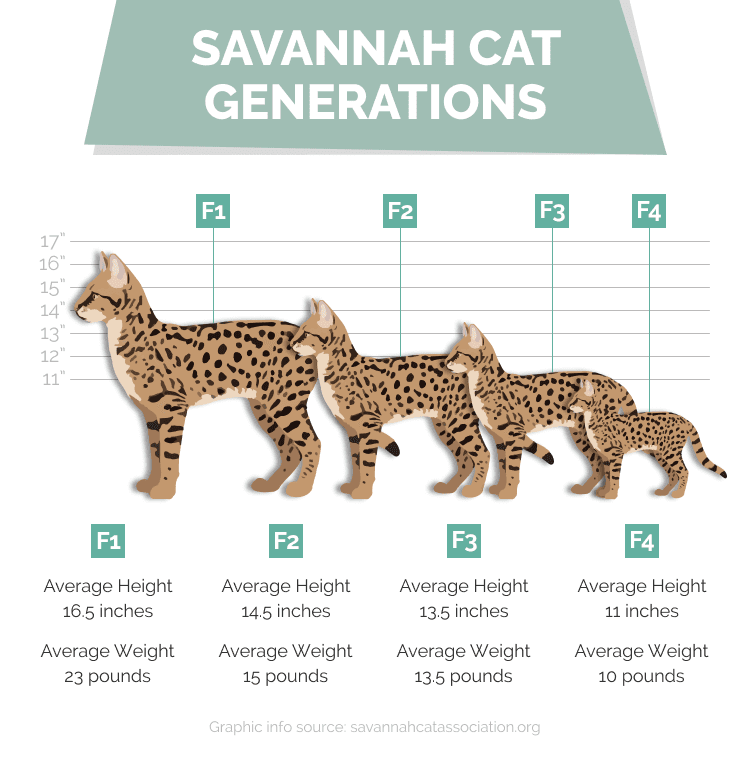
Because Savannah cats are hybrids (a mix of a domestic cat and a wild animal), some states (and even countries) ban their ownership. Luckily, most states have minor restrictions, such as allowing ownership of F2, F3, and so on. Some require a license to own Savannah cats, and some have no restrictions at all.
Savannah cats with more serval DNA (such as F1 and F2) are different from your average domesticated cat. For example, an F3 Savannah has a serval as a great-grandparent, an F4 has a serval as a great-great-grandparent, etc. This means that F1s and F2s can be more unpredictable than most breeds. Here are some of the various states’ regulations regarding Savannahs:
- In some states, such as Hawaii, Nebraska, Rhode Island, and Georgia, owning a Savannah cat is illegal, even for F5+. One of the reasons for this could be that Savannah cats could threaten wildlife in the area, although they’re usually not let out to free-roam.
- Some states allow some Savannah cat ownership without a license depending on their filial classification. For example, New Hampshire and Colorado allow F4 Savannah cats and their offspring (F5+), while New York allows F5s and their offspring.
- Some states allow all filial classes of Savannah, including F1 and 2. These include Virginia, Washington, and New Jersey.
- Some states require permits to own them, such as Delaware.
 Which Breed Is Right for You?
Which Breed Is Right for You?
Both the F1 and F2 Savannah cats are similar to one another. There hasn’t been enough mixing to see many physical or behavioral traits changing between the two, but there are a few notable differences. The F1 Savannah cat is more prone to wild behavior and generally mistrusts strangers. They can cause damage if they become aggressive, so thorough training is required.
The same is true for the F2, as they also need lots of time and training to integrate them into home life. However, they may have an easier time of it and are usually more open to strangers and children. Both can be walked on a leash if trained, and both love spending time with their families. Before adopting an F1 or F2, check the state and local regulations regarding Savannah ownership. If your area allows F1s and F2s, you may need to buy a permit for your pet.
Featured Image Credit: Kolomenskaya Kseniya, Shutterstock


